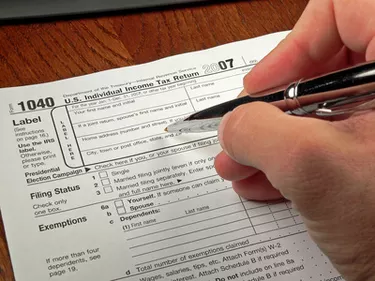
A taxpayer may give permission for somebody else, usually his tax agent, to sign a return on his behalf. While it is possible to give an agent power of attorney in dealing with tax officials, the ability to sign a return usually only applies if the taxpayer if physically unable to sign it himself. In a joint return, one spouse may sign on behalf of the other for medical reasons without the need for a formal power of attorney.
Power of Attorney
Video of the Day
As a general legal principle, a power of attorney is a document signed by an individual which gives somebody else the ability to act on his behalf in a legal context. The person given the ability is referred to as having "power of attorney." Despite the name, this person does not have to be a qualified lawyer. To avoid confusion, such a person is known in the United States as an attorney-in-fact, while a lawyer is formally known as an attorney-at-law.
Video of the Day
IRS Regulations
The rules relating to power of attorney with regard to tax returns are contained within Title 26 of the Code of Federal Regulations. The specific section is 1.6012-1(a)(5). The IRS explains how those regulations work in Publication 947, which discusses the roles of tax agents both in signing tax returns and representing clients in dealings with tax officials.
Limited Circumstances
Someone holding power-of-attorney normally can act on behalf of a taxpayer when dealing with tax officials, for example during an audit. However, there are only three circumstances when he is allowed to sign the tax return itself: if the taxpayer is physically unable to do so because of disease or injury, if the taxpayer will be outside the United States for at least 60 days before the deadline for making the tax return, or if the taxpayer has another reason accepted by an IRS district director as valid.
Required Paperwork
The person who signs the tax return must enclose a copy of the power of attorney document with the return. To save processing time, it is easiest to use the IRS-produced power of attorney document, form 2848. A self-produced document may be used, but could take longer to validate.
Joint Returns
In the event of a couple making a joint return, one spouse is allowed to sign on behalf of the other, without the need for a formal power of attorney. This only applies in cases of disease and illness. The spouse signing the return must attach a document detailing the reason for her spouse is unable to sign, and confirming that he has given oral consent for the signature to be made on his behalf.